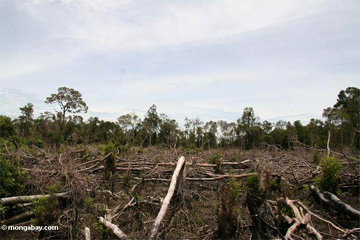One of the world’s largest and most prestigious fashion brands has stated it will stop sourcing paper from Indonesian forests and will drop Asia Pulp and Paper (APP) as a supplier, which has become notorious for tropical deforestation. The move comes after pressure from the Rainforest Action Network (RAN) on the fashion industry to stop sourcing paper from threatened rainforests for their shopping bags.
“Standing rainforests are not a luxury, they’re a necessity if the world wants to stop climate change,” said Mimma Viglezio, Executive VP Global Communications at Gucci Group. “Our actions are lowering our own carbon footprint, but we hope that they will also raise awareness inside the fashion industry that it’s possible for our industry to make a difference for rainforests and for the climate.”
Gucci has stated that by December 2010 it will use only recycled products or paper that is certified by the Forest Stewardship Council (FSC). Gucci is not alone: other fashion brands have made similar commitments, including Tiffany & Co., H&M Group, Staples and Unisource.
 Deforestation in Indonesia has made the country the world’s third highest emitter of greenhouse gases. Pictured here is logging of a peat forest in Kalimantan, Indonesia on the island of Borneo. Photo by: Rhett A. Butler. |
“The Gucci Group’s actions and commitments confirm its place as an industry leader,” said Lafcadio Cortesi, RAN’s Forest Campaign Director. “This move sets a bar for others in fashion and retail and demonstrates the foresight our society needs for our children and grandchildren to have standing rainforests and a stable climate.”
Deforestation is a major contributor to climate. Globally, the degradation and destruction of rainforests is estimated to contribute between fifteen and twenty percent of the world’s total greenhouse emissions. Indonesia is currently the world’s third highest emitter of greenhouse gases—after China and the United States—mostly due to the rampant and widespread destruction of its rainforests. Industry-driven destruction of rainforest—for paper, wood, and agricultural crops such as palm oil and soy—has also led to widespread biodiversity loss.
However, some critics say that efforts by RAN and fashion companies simply don’t go far enough; they criticize the FSC, an international not-for-profit organization, for certifying wood products sourced from plantations and old-growth forests. Still, many environmental organizations have retained their support of the FSC, including Greenpeace, the Nature Conservancy, and the World Wildlife Fund (WWF).
Related articles
Indonesia: emissions to rise 50% by 2030, 3rd largest GHG emitter
(09/22/2009) A report released by the Indonesian government shows the country is the world’s third largest greenhouse gas emitter, largely as a result of the destruction of rainforests and carbon-dense peatlands. Indonesia accounts for 8 percent of global carbon dioxide emissions.
Fashion labels drop APP after party highlights the plight of Indonesian forests
(09/21/2009) The fashion world has been rocked: not by the newest designer or the most shocking outfit, but by the continuing destruction of forests in Indonesia. On September 15th, the Rainforest Action Network (RAN) helped open New York City’s styling Fashion Week with a party to encourage fashion designers to take a closer look at the paper bags they give customers.
Retailers Costco and Amazon.com flunk sustainable paper use, WalMart and Target fare little better
(08/27/2009) Every year forests are destroyed for the production of paper: habitat is lost, greenhouse gases are released, species are impacted, and fresh water sources damaged. Some companies have begun to move towards more sustainable paper production, seeking paper sources stamped by the Forest Stewardship Council (FSC) and increasing the use of recycled paper, however other companies in the industry have yet to change their way.
The 3rd annual report card conducted by Dogwood Alliance and Forest Ethics focuses both on the companies who continue to make progress toward sustainable paper production—and those who don’t.